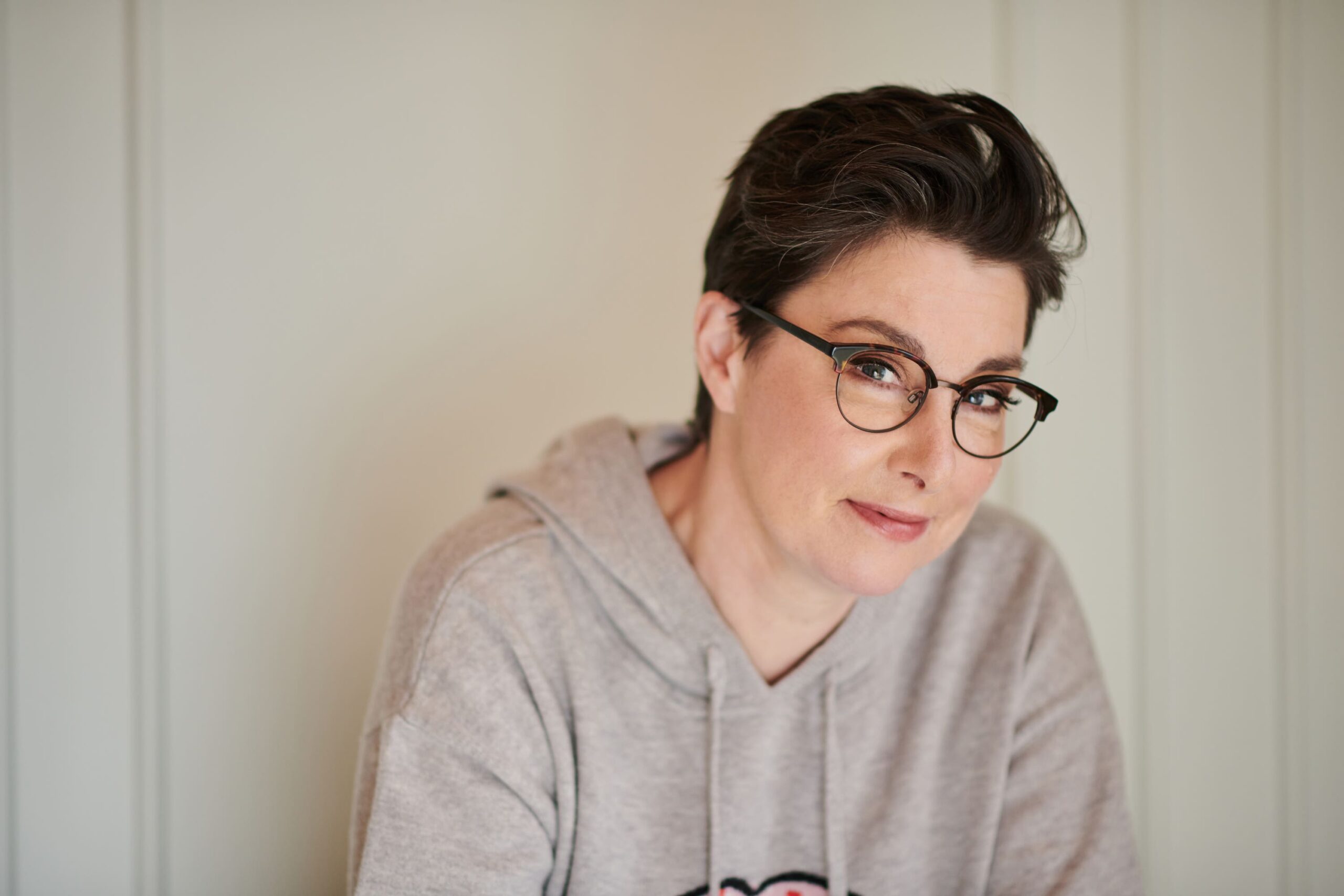Sue Perkins on the lessons she’s learned through losing her dad and her own brain tumour
It’s been a long, bumpy road, but Sue Perkins has learned a lot along the way.
Sue Perkins is fully on board with thinking mental and physical health can’t really be separated. “We do need to talk about health holistically – mental and physical health,” says Perkins, best known for presenting Bake Off from 2010-2016 and her comedy partnership with Mel Giedroyc.
She’s also keen that mental health conversations involve everybody. “Perhaps it’s oversharing, but I have therapy, and I’m sad that great quality therapy isn’t always readily available at the point of entry for everyone,” says Croydon-born Perkins, 52. “If anyone wants to do a campaign about that, I would be very happy to be on board, because it’s changed my life, and made me happier to be around and be with other people.”
Right now though, it’s Specsavers she’s teamed up with, highlighting their 2021 state of the UK’s eye health report, and urging people to go for routine tests.
Is there a creature on earth with just one eye…?Join @SuePerkins to find out, as she plays True or False with us pic.twitter.com/xXidZHKGQu
— Specsavers (@Specsavers) September 25, 2021
It’s generally recommended adults get checked every two years (sooner if you already have an eye problem or are experiencing symptoms or vision changes) – but the pandemic disrupted things. There was a 4.3 million drop in the number of eye tests delivered in 2020 (a 23% decline from 2019) and referrals to hospital eye services fell by 28%, according to Specsavers.
The high street chain is keen to highlight that their doors are open, and Perkins acknowledges leaving things like eye tests at the bottom of the priority pile is “easily done”.
“People have been under such vast external pressures,” she says. “Homeschooling, worrying about job security, where the money’s coming from, and when you take on board all of that, as well as the sense of panic and anxiety from a strange situation like this, things like taking care of oneself can easily become secondary.”
Eye tests are about so much more than just renewing your prescription for contacts or glasses, though. They can also reveal important things about your general health – like diabetes, high blood pressure, high cholesterol, inflammation and cancer – as well as detect early signs of eye health problems like glaucoma, before any obvious sight loss develops. This means people can start treatment before long-term damage occurs.

Sue Perkins with Bake Off co-stars Mel Giedroyc, Mary Berry and Paul Hollywood in 2012
“Early prevention is everything,” says Perkins, who has been wearing glasses since age 25. “If they do find something, in the vast majority of cases, you can have it sorted out. [Renewing your prescription] is important too, but there’s something more profound than that about taking an eye test.”
She can “completely understand” the human tendency to put things off, especially if we’re anxious. “A lot of the time, we don’t make appointments for our health or whatever it might be, in case it’s a bad outcome. And I can completely understand that, because I too share that anxiety at the moment, where everything is up in the air and strange and new. But the longer we leave it, the more likelihood there is that there could be a bad outcome.”
For Perkins, there is a much deeper, personal reason for valuing eye tests. Her dad Bert was diagnosed with a brain tumour in 2017, picked up by an optician. Sadly, Bert’s tumour was inoperable and he died six months later.
“This is the reason I’m part of the campaign, this is why I bang the drum,” says Perkins. “My dad’s sight was failing, he wasn’t going to the doctor. He was really scared. He was also of that generation where everyone was so polite, he didn’t want to bother anyone. In the end, we persuaded him to go for an eye test. A really young, incredibly brilliant optician did a health check and saw obviously that he had a brain tumour. She would have known, I’m pretty sure in that moment, that it was going to lead to the terminal diagnosis, but the way she handled the referral, the way she spoke to him was extraordinary.
“I think the way you’re told health outcomes massively changes things, and for the family. Of course, there’s a never-ending and deep sadness about his passing, but I have no rancour about the way he was treated, and I’m incredibly grateful to her for being so gentle.”

Teaming up with Specsavers is deeply personal for Perkins
Perkins is keen to emphasise that her dad’s case was “very rare” – but says the experience “woke me up” to how crucial it is to keep a check on your eye health, and also to the immense power of kindness. The optician’s handling of things will stay with her. “It’s hard to explain it, but to know that he [my dad] wasn’t unduly stressed by it, is everything. It was as good a way as possible of learning one of the worst things in the world, is all I can say.”
How has it influenced her own approach to taking care of herself? “I’m starting to really see that I need to make interventions, I guess in terms of what people now call ‘wellness’ – and I hate that phrase. My diet is very good, I’m vegetarian and love vegetables with a passion. I love boxing, that’s great for fitness, and there’s a shocking amount of good in punching! I highly recommend it.
“The biggest health worry I have is stress,” Perkins adds. “I would say my job is stressful, I’ve had some endocrine issues which have caused crippling anxiety, and yet I’ve [carried on working] through that, which means you’re dealing with adrenaline from work, crippling anxiety, and then the stress of having to cover it all up with a sort of cheery grin and ‘I’m absolutely fine, thanks!’
“In the future, I am going to have to think about how I manage stress, which I’m not great at, but equally if I can’t manage stress, how I then change my work-life balance. That’s the next journey for me, really.”
The endocrine issues she’s referring to are linked to the pituitary gland tumour she was diagnosed with in 2015. Although non-cancerous, the tumour wreaked havoc with her hormones, which she’s previously said caused “epic destruction” to her life. “Unmedicated, it caused huge levels of anxiety and all sorts of problems that were not much fun – but I’m medicated now and it’s under control,” she says.

Sue Perkins and Mel Giedroyc in the early days of their comedy career
It’s been a long, bumpy and ongoing road, though. “When I was ill and having a lot of stress, and I wasn’t going outside and the rest of it, having constant panic attacks, I learned a lot and really looked at all stresses in my life,” she reflects. “Stress is a natural response – some stress is biologically imperative, we need a bit of stress to keep us going, keep us alert.
“For me, [it’s about] what I’ve learned about dealing with stress, where it’s unhelpful and unwanted, when it feels too much, or when I’ve been too much – we need to be aware of when we might be causing stress too, by being too inflexible or whatever.”
And we’re all different. It’s about recognising “your own stress barometer. Set your own limit”, says Perkins. “Decide what’s motivating and exciting stress-wise, and what’s debilitating and exhausting. It’s impossible to eliminate all stress, but you can certainly eliminate some.”
Sue Perkins is working with Specsavers on its State of the UK’s Eye Health Report 2021.
The Press Association
Latest posts by The Press Association (see all)
- Princess Charlotte ‘s ninth birthday marked by picture release - May 2, 2024
- Strong passwords more important than ever, experts warn - May 2, 2024
- Princess Charlotte set to celebrate ninth birthday - May 1, 2024
- How edible flowers can make your dishes look and taste divine - April 30, 2024
- Beauty entrepreneur Liz Earle on turning 60: Ageing is a gift - April 30, 2024




















